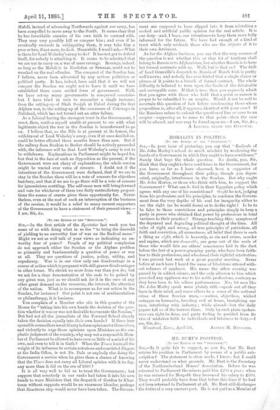I To THE EDITOR OF THE " SPECTATOR. "] SIR, — In the
first article of the Spectator last week you tax some of us with doing what in us lies " to bring the discredit of yielding to an unworthy fear of war on the Radical name." Might we not as well talk of your views as indicating an unworthy fear of peace ? People of my political complexion do not approach either the Soudan or the Afghan problem as primarily and fundamentally a question of peace or war at all. They are questions of justice, policy, utility, and expediency. War is in our view only one disadvantage in a course of action which is pregnant with still graver disadvantages in other forms. We shrink no more from war than you do; but we ask for a clear demonstration of the ends to be gained by any given war, just as we should ask for it in the case of any other great demand on the resources, the interest, the attention of the nation. What is to recompense us for our action in the Soudan, for instance ? Our point is not one of sentimentalism or philanthropy, it is business.
You complain of a Member who sits in this quarter of the House for " taking into his own hands the decision of the question whether it was or was not desirable to evacuate the Soudan." But had not all the journalists of the Forward School already taken the decision equally into their own hands ? If these irresponsible counsellors are at liberty to form opinions for themselves, and violently to urge those opinions upon Ministers as the emphatic judgment of the country, why may not a responsible Member of Parliament be allowed to have ever so little of a mind of his own, and even to tell it in Gath ? When the Times lends all the weight of its influence to certain notorious and convicted Jingoes at the India Office, is not Dr. Dale or anybody else doing the Government a service when he gives them a chance of knowing that the Tinges does not carry all Liberal opinion with it to-day, any more than it did on the eve of 1880 It is all very well to bid us to trust the Government; but suppose that somebody in our ranks had taken it into his own hands to warn Ministers that the despatch of Gordon to Kharionin without supports would be an enormous blunder, perhaps that disastrous step would never have been taken. The Govern
ment are supposed to have slipped into it from mistaking a cooked and artificial public opinion for the real article. It is our duty—and, I hope, our intention—to keep them more fully informed for the future. We have had enough of a kind of trust which only misleads those who arc the objects of it to their own detriment.
As for the Afghan business, you say that the very essence of the question is not whether this or that bit of territory shall belong to Russia or to Afghanistan, but whether Russia is to keep her formal contracts with us. Well, but is that so ? The drift of Lord Granville's despatch to Russia of March 10th is pretty well known; and nobody has ever hinted that a single clause or phrase of it points to a breach of formal contract. The whole difficulty is believed to turn upon the limits of the debateable and surveyable zone. If that is true, then you expressly admit that you agree with those who hold that a point so narrow is proper to be submitted to an umpire. Would it not be well to ascertain this question of fact before condemning those whose proposition is, after all, it appears, identical with your own P If the Russians refuse to submit the question of line or zone to an umpire—supposing us to come to that point—then the case will be altered, and war may be forced upon us.—I am, Sir, &c.,
A LIBERAL. BELOW TUE GANGWAY.


































 Previous page
Previous page